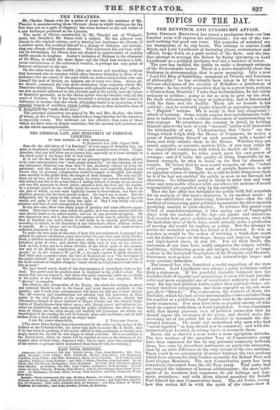THE CRIMINAL LAW, AND INSECURITY OF PERSONAL LIBERTIES.
TO THE EMITOR OF THE SPECTATOR.
8, Sergeant's Inn, 25th August 1846. Sra—In the able letter of "A Barrister," in your paper of Saturday last, my name is mentioned, coupled, however, with a most material error of fact. I hope, therefore, that you will allow me to correct this, especially as it bears strongly on the whole point of the larger half of that letter.
It is not the fact that the outrage on my personal rights and liberties, alluded to by your correspondent, was " most amply atoned for. On the contrary, all and any atonement whatever was from first to last absolutely refused by every de- wtment; and this although it was from the first most explicitly declared and known that no personal compensation would be sought or accepted, but simply some security to the public from the danger of such outrages. The only real do- fence set up was, that the Excise possess by statute the powers exercised: but this defence was felt to be so bad that—I having refused to accept HOSII-MONEY was felt necessary to divert public attention from the facts and the statute, by a personal attack on me, wholly beside the merits of the question, and for no one part of which, as was most explicitly known to Government, was there the htest ground, but the most precise reverse. On that I say no more. But the ation felt by many at this attack has, I fear, been the cause of the true merits and point of the case being lost sight of. May I very briefly call your attention and that of your correspondent to these. In my own case, there were many points of peculiar and most offensive aggra- vation. These have never come before the public, as I was most anxious that the ease should stand on its naked merits, and not on any personal sympathy. My own impression was, and is, that the true position of the case is, nakedly, the fact that in England any man's home is now liable to be entered, practically and according to statute, at the discretion of any subordinate officer, without redress or remedy. As a lawyer and an Englishman, that seemed and seems to me a sufficient statement of the facts.
To make the true .point of this state of facts felt and understood, I prepared and printed for private circulation, some time before the case first came before Parlia- ment, a detailed examination of this naked state of facts in a constitutional and historical point of view; and showed that while such is now on the statute- book as law, it was and is in direct violation of the whole spirit of the common law and of the British constitution, and a " badge of slavery upon the whole people," as, in the statute 1 W. and M., c. 10, such a power is justly described; that while such a statute exists the laws of England are NOT "the birthright of the people thereof," but are laws (to use the strong but just language of one of the most eminent of English Judges) "under which no Englishman would wish to live an hour."
We have heard much lately of the obnoxiousness of domiciliary visits in Ire- land. The power and the .practice exist in England to the fullest extent. The reason they are not noised is, that those who most commonly suffer are so wholly in the power of the Excise subordinates that they dare not complain. Their " slavery" is complete. The truth is, that irrespective of the Excise, the whole law relating to arrest and personal liberty is now in the loosest and most insecure condition in this country • and I trust your correspondent will direct his able pen to that subject. The old common and constitutional law afforded very full protection on these points to the civil liberties of the people; which has, however, silently but effectually—though in direct violation of Magna Charta and the dearest birth- rights of Englishmen—been taken away; and, though secret and unknown, be- cause too humiliating and heart-rending for public exhibition, the effects of this state of things are too often deeply and fearfully felt (instances are within my knowledge) in the rending for ever of domestic peace and confidence, and all that readers home a fond reality and not an empty name. • I am, Sir, yours respectfully, J. Toutnne SMITH.
• [The above letter having been communicated by the editor to the anther of the Letters on the Criminal Code, the latter begs leave to assure Mr. T. Smith, that if he has erred in speaking of the injury offered to that gentleman as having been amply atoned for, he will be now happy to stand corrected. He is no admirer of the Excise-laws; which he trusts will be repealed as soon as the finances of the country allow of their being dispensed with: but he must leave the consideration of the system to persons better acquainted than himself with its working.]


























 Previous page
Previous page